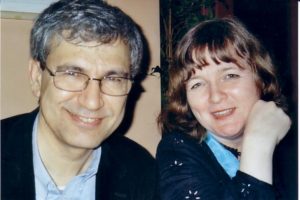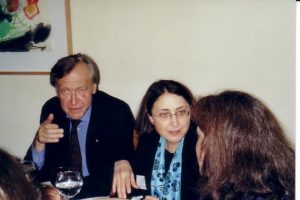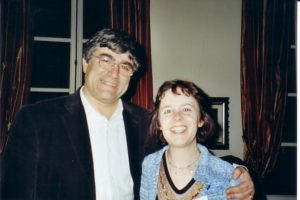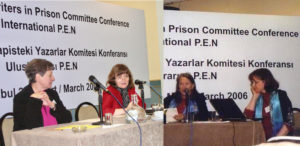Posts Tagged ‘Turkey Penal Code Article 301’
PEN Journey 35: Turkey Again: Global Right to Free Expression
PEN International celebrates its Centenary in 2021. I’ve been active in PEN for more than 30 years in various positions and now as an International Vice President Emeritus. With memories stirring and file drawers of documents and correspondence bulging, I am a bit of a walking archive and have been asked by PEN International to write down memories. I hope this personal PEN journey will be of interest.
PEN’s work attests to the power of the individual and also to a particular vision of globalization that advocates the global right to free expression, a right that supersedes national restrictions.
In February 2005 Orhan Pamuk, one of Turkey’s most noted writers, received threats and had his books burned by nationalist groups objecting to comments he made to a Swiss magazine while he was abroad. He referred to an Armenian “genocide.” While the Armenian community rallied to defend him, their support heightened certain nationalists’ protest in Turkey. Orhan wasn’t in Turkey at the time and hoped the turmoil would die down, but a government official in southern Turkey ordered the seizing of his books from local libraries so that they could be destroyed; it turned out later that there were none of his books in those libraries.

Novelist Orhan Pamuk and Sara Whyatt, International PEN Director of Writers in Prison Committee (Photo credit: Sara Whyatt)
At Pamuk’s request International PEN kept quiet publicly at first. In mid-April Sara Whyatt, International PEN’s Director of the Writers in Prison Committee (WiPC) and I had lunch with Orhan in London to discuss how PEN could help if the threat escalated. I was International Secretary of PEN at the time. We agreed that publicity at this stage could exacerbate the situation; however, we explained that PEN centers could work behind the scenes by direct contacts with their governments, and PEN would be prepared to step into public action should the need arise.
Pamuk intended to stay outside Turkey until late April/early May, but then he would be returning home to Istanbul. Sara stayed in touch with him and shared a plan for action if the threats resumed on his return. Meanwhile we told him PEN would continue to lobby for a change in the Turkish Penal Code that allowed the charges. Key PEN centers, who had good relations with their own governments, and centers from countries with influence in Turkey would make approaches. London’s WiPC would make similar approaches to Turkish officials in Ankara and also through mechanisms at the United Nations, OSCE, and the European Union (EU). At the time Turkey was hoping to become a member of the EU and was attempting to align its judiciary codes with those required by the EU. PEN also worked with the International Publishers Association .
PEN prepared a statement on the situation in Turkey from early 2005 and kept it updated with news and recommended actions for the over dozen PEN centers ready to respond on this case. There was also press guidance should the centers receive queries. Meanwhile PEN continued to work on the other cases of over 70 writers and intellectuals charged or in prison in Turkey, which had long been a country with a revolving door of writers harassed, detained, attacked and sent to prison.
On April 1, 2005 World Peace Day the Turkish press reported:
The investigation against author Orhan Pamuk due to this statement saying, ‘One million Armenians and 30,000 Kurds were killed’ [in Turkey] has ended with a case in which he is accused of violating article 301 of the new Penal Code (same as famous article 159 in the former one) “Insulting Turkish nationality” and with the demand of being imprisoned between six months and three years. The first hearing will take place at Istanbul Sisli No. 2 First Instant Criminal Court on December 16, 2005.
The Public Prosecutor claimed that Pamuk’s remarks in Switzerland’s Das Magazin were an infringement of Article 301/1 of the Turkish Penal Code which states that “the public denigration of Turkish identity” is a crime and that those found guilty should be given sentences ranging from 6-36 months.
With threats renewed by the Public Prosecutor and a lawsuit filed against Pamuk that could result in a three-year prison term, Orhan finally gave PEN the green light to launch its campaign. PEN centers mobilized globally, including in Turkey.
“It is a disturbing development when an official of the government brings criminal charges against a writer for a statement made in another country, a country where freedom of expression is allowed and protected by law,” I noted at the time.
Pamuk’s hearing in December, 2005 was approximately ten years after renowned Turkish writer Yaşar Kemal had been called to trial on similar charges in January 1995. Pamuk told a colleague he would underline two things in his statement:
1. What I said is not an insult, but the truth.
2. What if I were wrong? Right or wrong, do not people have the right to express their ideas peacefully in this Turkey?

Eugene Schoulgin, PEN International Board Member and Müge Sökmen (Turkish PEN) at WiPC Conference, Istanbul, 2006 (Photo credit: Sara Whyatt)
At the judicial hearing, PEN members came to stand witness to the proceedings, including WiPC Chair Karin Clark, Turkish PEN President Vecdi Sayar, and International PEN board member and former WiPC Chair Eugene Schoulgin. Armored police officers escorted Orhan as protesters hurled a barrage of eggs and jumped on the car, punching the windshield.
PEN’s observers reported at the time: “The scenes around the first appearance of Orhan Pamuk before Sisli No. 2 Court of First Instance on 16 December 2005 at 11:00 were marked by constant shouting and scuffling turning ugly and violent at times. As those attending the proceedings left the court, eggs were hurled along with insults from the nationalists and fascists among the crowd lining the pavement across the street. This in full sight of the national and international media which had turned out in full…
“The courtroom was packed with well over 70 people—among them famous Turkish writers such as Yaşar Kemal and Arif Damar, and representatives of the European Parliament, several diplomats, members of Turkish and international freedom of speech organizations. The aggression and heckling inside and outside the court did not abate…”
The session ended after an hour and 15 minutes with an adjournment because the Ministry of Justice said that it needed more time to decide on the legal basis of the trial.
Hearing the news of postponement, International PEN President Jiří Gruša declared, “It is unbelievable that Orhan Pamuk, one of Turkey’s best known and eminent authors, is in this situation. What it indicates is a complete disregard for the right to freedom of expression not only for Pamuk, but also for the Turkish populace as a whole. This decision bodes ill for other writers who are being tried under similar laws.”
He added, “PEN demands that the trials against all writers, publishers and journalists be halted and that the laws under which they are being tried be removed from the Penal Code. We also call on the Turkish authorities to put a definitive end to the penalization of those who exercise their right to freedom of expression.”

Hrant Dink, Journalist and Editor-in-chief Argos and Hilde Keteleer (Belgian Flemish PEN) at PEN WiPC Conference in Istanbul, Spring 2006 (Photo credit: Sara Whyatt)
At the time there were 14 other writers, publishers and journalists on trial under the newly revised “insult” law for criticizing the Turkish state and its officials. These included Ragip Zarakolu, publisher of books by Armenian authors and Hrant Dink, editor of an Armenian language newspaper, who was assassinated two years later.
For Pamuk the charges were dropped in January 2006, though on a technicality rather than on legal grounds protecting freedom of expression. The widespread opposition to Pamuk’s prosecution by PEN and other organizations succeeded, but as Turkish PEN President Vecdi Sayar noted in The New York Times: “There are many people abroad who fail to see beyond Orhan Pamuk’s trial. Saving a writer like Orhan Pamuk from prosecution may stand as a symbolic example on its own. But it is not an overall resolution for other intellectuals and writers that still face similar charges in Turkey.”
In March 2006 Orhan was the featured guest at PEN International’s Writers in Prison Committee’s biennial conference held in Istanbul, hosted by Turkish PEN.

Writers in Prison Conference Istanbul 2006. L to R: Karin Clark (International PEN Chair WiPC), Sara Whyatt (Director WiPC), Joanne Leedom-Ackerman (International Secretary International PEN), and Sara Wyatt (Photo credit: Sara Whyatt)
On October 12, 2006 Orhan Pamuk won the Nobel Prize for Literature.
It could be said that the case of Orhan Pamuk signaled a long ride to the end of Turkey’s potential membership in the EU. In September 2006 the European Parliament called for the abolition of laws such as Article 301 “which threaten Europe’s free speech norms.” In 2008, the law was reformed, but according to the reform, it remained a crime to explicitly insult the “Turkish nation” rather than “Turkishness,” and in order to open a court case based on Article 301, a prosecutor was required to have approval of the Justice Minister; a maximum punishment was reduced to two years in jail. In November 2016 the members of the European Parliament voted to suspend negotiations with Turkey over human rights and rule of law concerns. In February 2019 the European Union Parliament committee voted to suspend accession talks with Turkey.
Turkey continues to be one of the most problematic countries for writers, especially on certain topics. While Turkey’s Penal Code relaxed for a while, allowing more space and freedom for writers, in the last years, the code and its execution has grown more onerous than ever.
*****
In that spring of 2005, I attended an event celebrating Press Freedom Day (May 3), hosted by Italian PEN in Venice. There I shared testimonials from writers on whose behalf PEN had worked. I share these again here:
** Cuban journalist and poet Jorge Olivera Castillo was conditionally released from prison in December 2004 after serving 20 months of an 18-year sentence. He wrote:
Your solidarity has been a light in the darkness. Thank you for having elected me as an Honorary Member…[I send] to all of you my gratitude for your messages of support and your unflagging concern.
** Nkwazi Mhango, Tanzanian journalist in exile, wrote:
Believe it or not tears are gushing as I am writing this message. No way in whatsoever manner my family and I can reciprocate your love and commitment to our plight. THANKS AGAIN AND AGAIN AND AGAIN MORE.
** On a sadder note the following was received from Tunisian internet writer Zouhair Yahyaoui, who died suddenly in March 2005 from a heart attack after he’d been released from prison:
Your email gave me once again a lot of hope for a better future in my country at a time when the dictatorship uses all illegal and barbaric means to make us give up and abandon all forms of protest…The fact that I continue to struggle to obtain our right to freedom of expression, here in Tunisia, is thanks to support of members of International PEN and other international organizations. Thank you again to you, to the Writers in Prison committee of International PEN and to all the PEN clubs all over the world who have supported me enormously during my imprisonment and who continue to do so.
** And from Chinese writer Jiang Qisheng:
… I am not a remarkable person. I am just an ordinary guy who did something extraordinary because it was the right thing to do…If my own case has any special significance it is only that it forces people to face a highly embarrassing fact—the fact that even now, in the dawn of the 21st century, a Chinese citizen can be imprisoned for what he says.
** I ended with a passage from the book This Prison Where I Live, the collection of prison writings drawn together by International PEN’s Writers in Prison Committee. In the afterword Malawian poet Jack Mapanje, who himself was in prison during the autocratic rule in his country, tells how bits of news managed to get smuggled into him in his concrete cell filled with spiders and cockroaches, scorpions and bats and bat droppings.
I found the note, unusually fat…I found a bulletin of typed world news and two poems by Brecht…Pat also enclosed two honorary membership cards from International PEN’s English and American centers, issued in London and New York respectively. They each bore my name. I had been made a member of PEN. Well, well, well!…
Then there was a cutting from Britain’s Guardian newspaper. Lord Almighty! A picture of Ronald Harwood, Harold Pinter, Antonia Fraser, and other members of English PEN reading from my book of poems in protest at the Malawi High Commission in London! It must sure have an effect, I thought. Ten thousand miles away, among the cockroaches of the prison where I lived I felt utterly humbled. Shattered. Such generosity, such warmth I surely did not deserve. All for one slim volume of poems? Why hadn’t I written more poems? I was dumbstruck. Despair vanquished. ‘I am belonged,’ I heard myself whisper.
Next Installment: PEN Journey 36: Bled: The Tower of Babel—Part One